MercoPress. South Atlantic News Agency
Tag: Weddell sea
-
Tuesday, July 8th 2025 - 06:48 UTC
Falklands Maritime Heritage Trust Unveils World-First Shipwreck Experience at Goodwood Festival of Speed
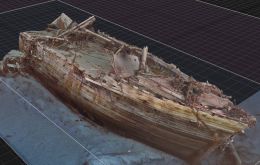
The Falklands Maritime Heritage Trust (FMHT) is proud to bring one of the most extraordinary deep-sea discoveries of our time to the 2025 Goodwood Festival of Speed. As part of the prestigious Future Labs installation, FMHT will showcase the pioneering technology behind the historic mission that located Sir Ernest Shackleton’s legendary ship, Endurance, beneath Antarctica’s frozen Weddell Sea.
-
Thursday, December 22nd 2022 - 10:14 UTC
EU and US satellites together with BAS calibrating ice at Weddell Sea

An ambitious flying campaign out of British Antarctic Survey’s Rothera Research Station over the Weddell Sea this month (December) aims to calibrate the data collected from two important satellites that monitor Antarctic sea ice.
-
Friday, March 25th 2022 - 09:41 UTC
Strange living creatures found in Antarctica
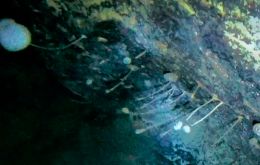
A team of geologists found a group of creatures in an area of Antarctica where life was deemed near to impossible, it was reported.
-
Wednesday, March 9th 2022 - 10:55 UTC
Sir Ernest Shackleton’s Endurance is Found
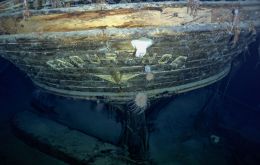
The Falklands Maritime Heritage Trust confirmed on Wednesday that the Endurance22 Expedition has located the wreck of Endurance, Sir Ernest Shackleton’s ship which has not been seen since it was crushed by the ice and sank in the Weddell Sea in 1915.
-
Saturday, January 22nd 2022 - 09:46 UTC
Researchers detect around 60 million nests of Antarctic icefish in the Weddell Sea, Current Biology report.

Near the Filchner Ice Shelf in the south of the Antarctic Weddell Sea, a research team has found the world’s largest fish breeding area known to date. A towed camera system photographed and filmed thousands of nests of icefish of the species Neopagetopsis ionah on the seabed. The density of the nests and the size of the entire breeding area suggest a total number of about 60 million icefish breeding at the time of observation. These findings provide support for the establishment of a Marine Protected Area in the Atlantic sector of the Southern Ocean. A team led by Autun Purser from the Alfred Wegener Institute publish their results in the current issue of the scientific journal Current Biology.
-
Tuesday, June 30th 2020 - 09:49 UTC
South Pole warming at three times the global rate over the last three decades

At the South Pole, considered the coldest point on Earth, temperatures are rising fast. So fast, in fact, that Kyle Clem and other climate researchers began to worry and wonder whether human-driven climate change was playing a bigger role than expected in Antarctica.
-
Monday, June 29th 2020 - 18:32 UTC
Sea ice in the Weddell Sea has decreased by one million sq kilometers in five years

Scientists have discovered that summer sea ice (*) in the Weddell Sea area of Antarctica has decreased by one million square kilometres – an area twice the size of Spain – in the last five years, with implications for the marine ecosystem. The findings are published this month in the journal Geophysical Research Letters.
-
Wednesday, November 6th 2019 - 09:44 UTC
CCAMLR fails to designate marine protection areas in East Antarctica, Pew regrets
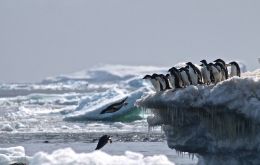
The Pew Charitable Trusts expressed disappointment that for an eighth consecutive year, the Commission for the Conservation of Antarctic Marine Living Resources (CCAMLR) ended its annual meeting without designating marine protections in the waters off East Antarctica. Member governments also failed to reach consensus on the designation of marine protected areas (MPAs) in the Weddell Sea and Antarctic Peninsula.
-
Thursday, April 25th 2019 - 09:30 UTC
Thousands of emperor penguin chicks died in 2016 destroyed by severe weather, reports a BAS team

Thousands of emperor penguin chicks drowned when the sea-ice on which they were being raised was destroyed in severe weather. The catastrophe occurred in 2016 in Antarctica's Weddell Sea. Scientists say the colony at the edge of the Brunt Ice Shelf has collapsed with adult birds showing no sign of trying to re-establish the population.
-
Saturday, April 13th 2019 - 08:12 UTC
Searching for Admiral Graf von Spee’s great cruiser fleet sunk at the Falklands Battle
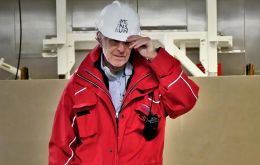
In 2014-2015, to mark the centenary of the Battle of the Falklands, Mensun Bound, a Falkland Islander himself, led an expedition to try to find Admiral Graff von Spee’s lost cruiser squadron in 1914, the whereabouts of which has become one the great mysteries of the maritime world. Now he is resuming the hunt. Mercopress began by asking how it all began.
